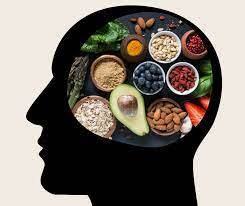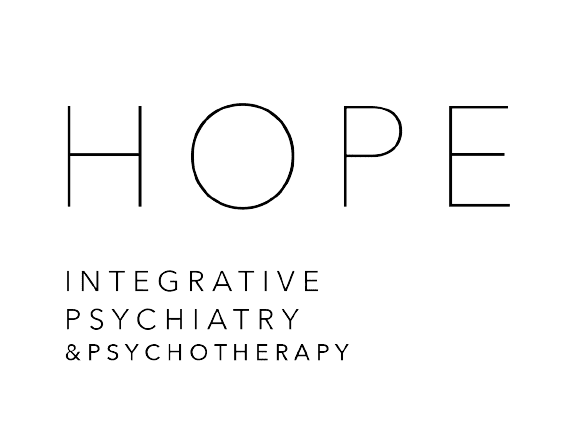The mind-body connection has long been recognized as a cornerstone of well-being.Nutrition is associated with better mental Health outcomes, whereas a poor diet is associated with a greater risk of depression and anxiety.
Integrative psychiatry, a holistic psychiatry approach, acknowledges the profound impact that nutrition, supplements, and dietary interventions can have on brain function, mood and emotional stability.
By combining traditional therapeutic approaches with cutting-edge nutritional insights, integrative psychiatry offers a comprehensive framework for promoting mental wellness.

The Nutritional Foundation
Nutrition serves as the foundation upon which our mental and emotional well-being is built. A well-balanced diet provides essential nutrients that support brain health, neurotransmitter production, and overall cognitive function.
1. Omega-3 Fatty Acids:
Omega-3 fatty acids, commonly found in fatty fish like salmon and flaxseeds, are critical for brain health. They play a vital role in neurotransmitter production and have been associated with improved mood and cognitive function.
2. B Vitamins:
B vitamins, including B6, B9 (folate), and B12, are essential for nerve function and the production of neurotransmitters like serotonin and dopamine. Adequate intake of these vitamins is crucial for mood stability.
3. Antioxidants:
Antioxidant-rich foods, such as fruits and vegetables, protect brain cells from oxidative stress and inflammation. These compounds support cognitive function and may contribute to mood regulation.
4. Protein and Amino Acids:
Amino acids are the building blocks of neurotransmitters. Incorporating protein-rich foods into the diet ensures a steady supply of amino acids necessary for optimal brain function and emotional well-being.
Supplements for Brain Health
In conjunction with a balanced diet, supplements can play a valuable role in enhancing brain function and promoting mood stability within integrative psychiatry.
1. Omega-3 Supplements:
For individuals who struggle to consume sufficient omega-3 fatty acids through their diet, supplements can provide an effective way to support brain health and emotional balance.
2. Vitamin D
Adequate vitamin D levels are associated with improved mood. Especially relevant for those in regions with limited sunlight, vitamin D supplementation may contribute to enhanced mental well-being.
3. Magnesium:
Magnesium is crucial for nerve function and relaxation. Supplementing with magnesium may help alleviate symptoms of anxiety and promote a sense of calm.
4. Probiotics:
The gut-brain connection is a key consideration in integrative psychiatry. Probiotic supplements can support gut health, which in turn may positively influence mood and cognitive function.
Dietary Interventions and Mental Wellness
Beyond individual nutrients and supplements, dietary interventions can have a profound impact on mental wellness within integrative psychiatry. Many patients report healing depression through dietary interventions.
1. Mediterranean Diet:
A boon for brain health due to its emphasis on antioxidant-rich fruits, vegetables, and olive oil, which help combat oxidative stress and inflammation linked to cognitive decline as well as overall reducing risk of depression. Abundant in omega-3 fatty acids from sources like fish and nuts, this diet supports optimal brain function and has been associated with a lower risk of neurodegenerative disorders. The inclusion of whole grains and lean proteins in the Mediterranean diet provides a steady source of nutrients that contribute to improved cognitive performance and overall brain well-being.
2. Low Glycemic Index Diet:
Stabilizing blood sugar levels through a low glycemic index diet can help prevent energy crashes and mood fluctuations. By reducing rapid spikes and drops in blood sugar, this diet provides a steady and sustained supply of glucose to the brain, supporting cognitive function and concentration.
3. Elimination Diets:
Some individuals may experience mood disturbances due to food sensitivities. Identifying and eliminating trigger foods can lead to improved mental well-being. By systematically removing specific foods and then reintroducing them, individuals can pinpoint triggers that might impact brain function negatively. This targeted approach enables better management of dietary factors that may be influencing neurological well-being and allows for the customization of one’s diet to support optimal cognitive performance and emotional stability.
4. Anti-Inflammatory Diet
By emphasizing nutrient-dense foods rich in antioxidants and omega-3 fatty acids, this diet supports optimal brain function and preserves cognitive abilities. Furthermore, mitigating inflammation through such a diet promotes a healthy gut-brain axis, enhancing communication between the gut microbiota and the brain, which plays a vital role in mood regulation and overall neurological well-being.
5. Mindful Eating
Incorporating mindfulness into eating habits fosters a deeper connection with food, enhances awareness of hunger and fullness cues, and may positively impact emotional regulation.
The Gut-Brain Axis
Integrative psychiatry recognizes the intricate relationship between the gut and the brain. The gut-brain axis plays a significant role in mood regulation and cognitive function.
1. Microbiome Health:
A balanced and diverse gut microbiome is associated with improved mental health outcomes. Consuming prebiotic and probiotic foods nourishes the gut microbiota and supports emotional well-being.
2. Inflammation and Mood
Chronic inflammation in the body can contribute to mood disorders. Nutrient-dense foods and anti-inflammatory diets can help mitigate inflammation and promote mood stability.
3. Serotonin Production
The majority of serotonin, a neurotransmitter linked to mood, is produced in the gut. A healthy gut environment supports optimal serotonin production and may positively influence mood.
In the realm of integrative psychiatry, nutrition, supplements, and dietary interventions stand as powerful tools for enhancing brain function and fostering mood stability.
By recognizing the symbiotic relationship between the mind and body, integrative psychiatry offers a holistic approach that considers the impact of dietary choices on mental well-being. Whether through the incorporation of essential nutrients, targeted supplements, or mindful dietary interventions, individuals can harness the potential of nutrition to support cognitive function, emotional resilience, and overall mental wellness.
As we continue to explore the intricate connections between nutrition and mental health, integrative psychiatry shines as a beacon of hope, guiding individuals toward a path of nourishment for both the mind and soul.

